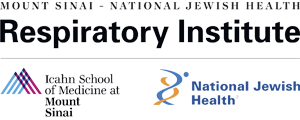
Lung Cancer Program
The Mount Sinai Health lung cancer specialists diagnose, treat, and manage all stages of lung cancer. We can also help with prevention and are highly skilled and experienced with tumors of the chest or thoracic area. We offer advanced and non-surgical procedures. Our doctors’ work together to provide individualized treatment that best meets your needs.
We work closely with National Jewish Health to bring you the care you need. Our team approach brings together pulmonologists and other specialists for diagnosis and treatment. Our experts include cardiologists, allergists, gastroenterologists, rheumatologists, ENT (ear, nose, and throat) specialists, and thoracic surgeons.
Types of Lung Cancer
There are two particular types of lung cancer that you may be faced with: small cell cancer or non-small cell cancer.
Small cell lung cancer (SCLC) has two stages: combined small cell carcinoma and small cell carcinoma. Approximately 10% to 15% of lung cancers are SCLC.
The far more common type of lung cancer is non-small cell lung cancer (NSLC) which accounts for 85 to 90% of lung cancers. NSCLC’s include adenocarcinoma, large cell carcinoma, and squamous cell carcinoma.
Causes of Lung Cancer
There are multiple risk factors that are attributed to causing lung cancer. Some of these causes may include:
- Exposure to airborne toxins
- Family history/genetics
- Secondhand smoke
- Smoking
Symptoms of Lung Cancer
The sooner you can receive a lung cancer diagnosis, the better the chances you have at defeating the disease. Lung cancer may not cause any symptoms early in the course of the disease. Please contact one of our pulmonologists if you are experiencing a combination or all of the following symptoms:
- Chest pain that is often worse with deep breathing, coughing, or laughing.
- Chronic cough
- Coughing up blood or rust-colored sputum (spit or phlegm)
- Extreme fatigue
- Hoarseness
- Shortness of breath
- Weight loss and loss of appetite
Diagnostic Techniques for Lung Cancer
The diagnosis of lung cancer generally involves some type of biopsy. Most patients receive one of two general types of biopsy, either a needle biopsy by a radiologist while lying in a CT scanner for guidance, or by bronchoscopy. Bronchoscopies are performed by either pulmonologists or thoracic surgeons, and involve insertion of a small flexible tube into the airway under sedation. Bronchoscopic biopsy techniques include:
- Electromagnetic Navigation Guided biopsy
- Endobronchial ultrasound (EBUS) – transbronchial needle aspiration
- Transbronchial forceps biopsy
Treatments for Lung Cancer
We offer a wide variety of treatments for lung cancer. Treatments will depend on the type of lung cancer you have: small cell or non-small cell.
Small cell lung cancer
The treatment options for small cell lung cancer (SCLC) are based mainly on the stage (extent) of the cancer, but other factors, such as a person’s overall health and lung function are also important. Sometimes, more than one of type of treatment is used. If you have SCLC, you may first start your treatment with chemotherapy. If you have limited stage disease, radiation therapy and surgery may be options as well.
- Chemotherapy
- Immunotherapy
- Palliative procedures
- Radiation therapy
- Surgery
Non-Small Cell Lung Cancer
The treatment options for non-small cell lung cancer (NSCLC) are mainly dependent upon on the cancer stage or your overall health and lung function as well as certain traits of the cancer itself, are also important. In many cases, multiple types of treatment may be used.
- Chemotherapy
- Immunotherapy
- Palliative procedures
- Radiofrequency Ablation (RFA)
- Radiation therapy
- Surgery
- Targeted drug therapy
Why Mount Sinai–National Jewish Health Respiratory Institute
National Jewish Health, the nation’s leading respiratory hospital, has partnered with the Mount Sinai Health System to create the Mount Sinai – National Jewish Health Respiratory Institute. We perform groundbreaking research into diagnostic and treatment options. For instance, our doctors have shown that annual computed tomography scans can find up to 85 percent of lung cancers early on, when they are most treatable. We also conduct clinical trials of the latest medical advances, which are available to you if you qualify. In addition, our Lung Cancer Screening Program follows former and current smokers and others who are at increased risk. We use a team approach to provide seamless access to care. When you come to Mount Sinai – National Jewish Health Respiratory Institute, you know you are in good hands.
